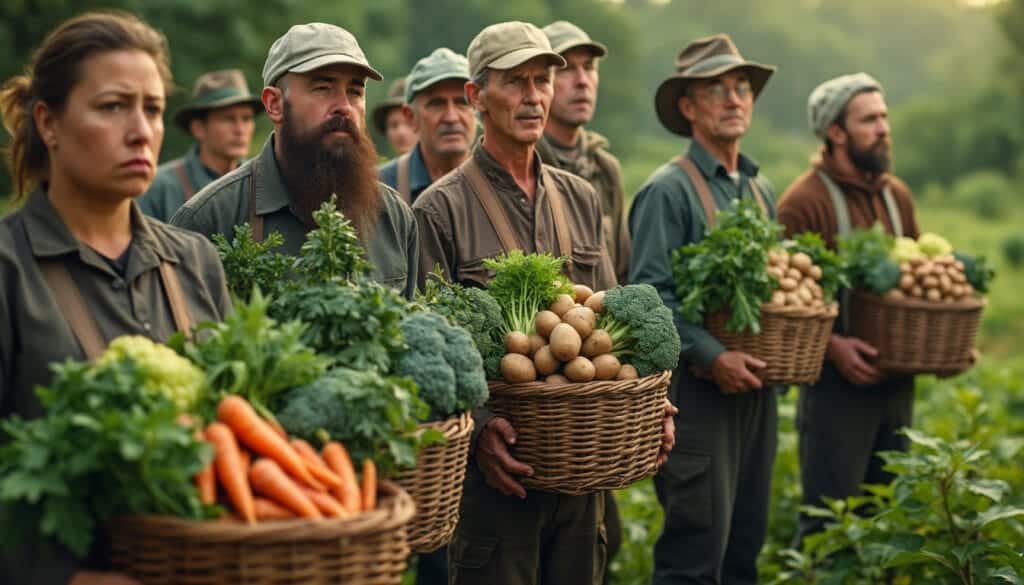Supermarkets are intensifying their price battle over vegetables. Incredibly low offers attract consumers during holiday seasons. However, this strategy raises serious concerns among producers.
Promotions like potatoes at 8p for 2kg from Asda and Aldi are jeopardizing the value of agricultural products. Farmers fear that these massive discounts, also seen at Christmas, may permanently devalue their crops. The National Farmers’ Federation is calling for fair pricing to ensure future food security. Meanwhile, supermarkets defend their actions by stating that they promote healthy and accessible food for all households.

Why are British supermarkets drastically cutting vegetable prices?
As Easter approaches, British supermarkets have launched a real price war by offering vegetables at unbeatable prices. Chains such as Asda and Aldi are selling 2 kg bags of potatoes for only 8p, while Tesco and Sainsbury’s offer the same products at 15p for loyalty card holders. This strategy aims to attract the maximum number of consumers during holiday periods, notably Christmas and Easter, by providing enticing promotions on a variety of products like carrots, broccoli, and zucchini.
These massive discounts are well below the usual prices, which range from £1.35 to £2.50 for vegetables from recognized brands such as Albert Bartlett. This low-price policy allows supermarkets to stand out from the competition and increase their sales volume. However, this strategy has significant repercussions for local producers, who see their work and investments undervalued.
What are the impacts of excessive discounts on local producers?
British farmers are expressing serious concerns about the spectacular discounts being offered by supermarkets. According to Tom Bradshaw, president of the National Farmers’ Union, these promotions can harm the perception of the true market value and production costs, thus compromising future food security. Bradshaw emphasizes that if these practices continue, they could lead to a permanent decrease in farmers’ incomes, making it difficult to invest in ensuring high-quality food production.
Scott Walker, head of the GB Potato association, shares these concerns. He states that the prices set by supermarkets do not reflect the costs of production, such as planting, harvesting, and transporting fresh vegetables. This discrepancy could mislead consumers about the true cost of these products, leading to a permanent devaluation of farmers’ efforts.
Moreover, Dale Robinson, purchasing manager at Riverford Organic Farmers, points out the negative impact of severe promotions. He explains that the high production costs cannot be covered by such low prices, jeopardizing the sustainability of agricultural practices. Robinson highlights that these discounts create unrealistic expectations among consumers, leaving farmers struggling to cover their essential expenses.
How do low prices affect the sustainability of British agriculture?
The sustainability of British agriculture is being severely tested by supermarkets’ low-price policies. Rising costs, particularly related to wages and social security contributions, as well as new barriers to importing vital resources like young plants and seeds post-Brexit, further complicate the situation for producers. The reduction of 20,000 hectares dedicated to potato farming in the UK over the past five years is tangible proof of this.
The costs of machines and other equipment necessary for managing root vegetable crops have also increased, exacerbated by the uncertainty in yields due to increasingly unpredictable weather conditions linked to the climate crisis. Scott Walker emphasizes that the reduction of cultivated land is just a symptom of a deeper problem: an unfavorable risk-reward situation for farmers. This situation threatens not only current production but also the future capacity to meet growing food demand.
Do supermarkets take responsibility for these practices?
Supermarkets defend their actions by claiming they bear the cost of discounts and that these promotions do not affect payments made to suppliers and farmers. Andrew Opie, director of food and sustainability at the British Retail Consortium, argues that discounts allow consumers to discover and consume more fresh vegetables, thus contributing to a healthy diet for all households. According to him, retailers understand the importance of a robust supply chain and the need to offer a fair price to farmers while ensuring excellent value for customers.
However, this view is contested by farmer representatives, who believe that supermarkets do not adequately consider the real production costs. They argue that excessive discounts undermine producers’ efforts to maintain sustainable practices and invest in the future of British agriculture. This divergence of views reflects a broader debate on corporate social responsibility and the role of supermarkets in supporting local producers.
What solutions do producers propose to counter this trend?
In the face of the challenges posed by aggressive supermarket discounts, British producers are seeking ways to ensure fair remuneration and protect the sustainability of their activities. One proposed solution is the promotion of a transparent market, where consumers truly understand the production costs and added value of local products. This involves better communication about agricultural practices and the necessary investments to ensure quality production.
However, it is also crucial to encourage investments in sustainable technologies and innovative agricultural practices to reduce production costs and increase efficiency. Initiatives such as innovative solar solutions can play an important role in helping producers decrease their reliance on fossil fuels and reduce their energy costs.
Additionally, partnerships with organizations focused on sustainability, such as those involved in deploying smart water meters, can offer additional resources and support to adopt more resilient and environmentally friendly agricultural practices.
What are the long-term food security challenges?
Current practices of reducing vegetable prices by British supermarkets raise crucial questions regarding long-term food security. By minimizing the prices of fresh products, supermarkets risk compromising the viability of small farms, essential for crop diversity and the resilience of the national food system. Tom Bradshaw insists that a fair market is essential to ensure sustainable agricultural production and to respond to future food needs of the British population.
Moreover, excessive reliance on promotions may encourage consumers to prioritize purchases based on price rather than on quality and provenance of products. This could lead to a general decline in quality standards and a decrease in demand for locally and sustainably grown food. Scott Walker mentions that this trend could also reduce incentives for farmers to invest in innovative and sustainable practices, further exacerbating the challenges posed by climate change and unpredictable weather conditions.
In conclusion, to preserve food security and support local agriculture, it is imperative to find a balance between affordable prices for consumers and fair remuneration for producers. Collaborative initiatives between supermarkets, farmers, and sustainability organizations are needed to create an environment where food production can thrive while meeting economic and environmental demands.
How can new technologies help solve this problem?
The adoption of new technologies represents a key opportunity to mitigate the effects of excessive discounts on agricultural producers. For example, innovative solar solutions allow farmers to reduce their energy costs and increase their energy independence, making production more profitable. By integrating green technologies, producers can decrease their reliance on costly and unstable energy sources, thereby improving their competitiveness in the market.
Furthermore, installing smart water meters enables efficient water coverage and allows for more precise management of water resources, crucial for irrigation and crop growth. These technologies promote sustainable use of natural resources, reducing operational costs and enhancing resilience to unfavorable climate conditions.
Additionally, integrating automated management systems and smart sensors in agricultural operations can improve crop precision, reduce losses, and optimize the use of inputs such as fertilizers and pesticides. These technological innovations enable farmers to maximize their yields while minimizing costs, thus contributing to improving the overall profitability of their operations.
What initiatives can support farmers in this challenging context?
To support farmers in the face of challenges posed by supermarkets’ low-price policies, several initiatives can be implemented. One of the first measures is the promotion of short supply chains and local markets, allowing producers to sell their products directly to consumers without going through large retail chains. This ensures fairer remuneration and strengthens the ties between producers and consumers.
Additionally, grants and financial aids can be provided to farmers to help them adopt sustainable practices and invest in innovative technologies. These aids could include funding for the installation of solar panels, water management systems, or advanced agricultural equipment. Furthermore, awareness and training programs can be established to educate producers about best agricultural practices and encourage them to diversify their crops to reduce economic risks associated with price volatility.
Partnerships with organizations like the National Farmers’ Union can also play a crucial role in providing logistical support and advocating for fairer policies at the governmental level. By collaborating with other actors in the food supply chain, farmers can strengthen their position during negotiations with supermarkets and ensure better protection of their economic interests.
Finally, encouraging consumers to prioritize local and sustainable products also helps support farmers. By choosing to buy directly from producers or participating in agricultural cooperative initiatives, consumers can help create stable and fair demand for fresh products, thus ensuring adequate remuneration for farmers’ efforts.
Articles similaires
Thank you!
We will contact you soon.














